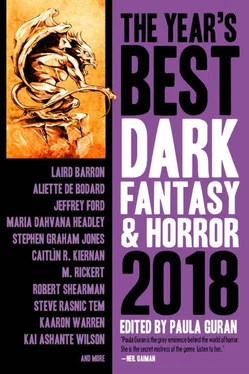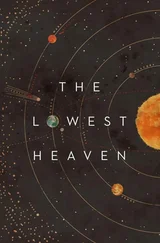Allan’s Record Xchange was closed today, but Colin had arranged for me to meet its proprietor there. I knocked on a window that was almost entirely coated with ancient posters for local bands until he opened the door and peered out to inspect me. Allan was an old dandy. Despite the decrepitude of his business, he still fussed about the racks in a stiff white shirt, a paisley cravat, a waistcoat and scuffed wingtips. His hair was fine and grey and long, pulled into a limp ponytail that danced around his head as he moved and talked. The shop was dark and dusty and crowded from floor to ceiling with records. Over the years his stock had overflowed into crates and boxes and across ancient shelves that bowed beneath the weight of all that old vinyl.
“This record, Sunflower Junction , is good,” I said after we’d made small talk for a while. “It’s not just me, is it? There’s a sense of history to it, knowledge of what’s gone before, and then he’s taken it somewhere else.” I wasn’t sure what it was I was trying to convey but I was all too aware that this was as motivated as I’d felt for months. “There’s an intelligence to it. It’s raw but there’s something happening beneath it all.”
Allan paused from rifling through a pile of music papers behind the counter. “Well, yes, I suppose so,” he said. “But it also could be seen as wildly derivative of all kinds of those jazz-folkies from the late sixties, early seventies. And it’s awfully self-indulgent at times, but yes, it certainly had potential. He had potential.”
There was something else, something fragile and elusive in the music that I couldn’t decide how to articulate, an element that people seemed to have missed, but I let that go for the moment. “How was he that night?” I asked instead.
“Well there was no performance , you see,” Allan said. “No attempt to connect with his audience. And it was a good turnout. A lot of people had presumably heard the same thing you have in the record and came out on the strength of it. I suppose it’s something you can’t put your finger on.
“But what worked on disc just didn’t work live. Some people said he’d changed after the record was done. For most of the night he barely acknowledged the audience, and if that hadn’t alienated them enough, he decided to turn the show into an extended jam session that lasted almost half an hour. The same song, over and over.”
“Sunflower Junction,” I said.
“Yes. It was as if he was trapped inside the song.” Allan paused for a moment. “I thought he looked lost that night, utterly lost.”
“Do you know anything about him?” I asked. “I looked online, but he’s like a ghost.”
“Indeed,” Allan said. “I have friends who know him. Or knew him. I can hook you up with one of them. He hasn’t really resurfaced since those gigs. Someone told me he was working on a new record but whether that’s true or not, I honestly can’t say. I heard he’d ended up homeless, crashing on friends’ couches or even rough down on Bottle Alley. I don’t know where he is now. Ah, here we are…”
Allan produced a yellowed music paper from one of the piles he’d been ferreting around in. He leafed through it and placed it on the counter when he’d located the appropriate page. “There it is,” he said. “The one and only interview with Hugo Lawrence. Take it,” he said. “It’s on the house.”
Alternative Brighton Times
At the Sunflower Junction with Hugo Lawrence.
Hugo Lawrence is a prodigious talent, touched with a chameleonic quality that allows him to slip from bucolic acoustic reveries to psychedelic jazz workouts and all points in between. After earning his spurs in the bars and clubs of London and Sussex, Lawrence’s improvisational skills and virtuoso guitar playing have led to him being compared to Nick Drake or Tim Buckley. He’s chosen to surround himself with a group of hugely accomplished musicians and Sunflower Junction , his first album, is released this week.
I talked with Lawrence before his recent Brighton show to find out where this fusion of folk and jazz comes from.
ABT: How did you get started?
HL: Well, I’ve had a few lives in music. I started out in punk bands, playing the Underground clubs in London. Sleeping on basement floors, waking up with scabies, that sort of thing. That was how I learned to play - just five shows a week, in and out, cash in the back pocket if you were lucky. Then I got tired of that and started getting into folk and jazz, just tracking down record stores and absorbing whatever the old guys in there would turn me onto. Then I got onto the folk circuit, collaborating and doing improvisational stuff, trying to push the envelope, take the music somewhere new. Just jamming, you know? Learning what your style is, what it is you want to say.
ABT: And what is it that you want to say?
HL: Oh man, well with this first record it started out as one thing, all these musical influences coming out and me trying to transpose myself across them. But then we started jamming one night after doing mushrooms and we got Sunflower Junction out of it. I’m glad someone was there to press the record button because I’m pretty sure we couldn’t have got back to that place again. Lightning in a bottle s**t!
ABT: And what is Sunflower Junction to you?
HL: That’s a difficult question to answer. The night that we played it for the first time, it seemed to already exist, and we just sort of summoned it into the room, fully formed. It’s very personal to me. To all of us, I guess, but something changed for me that night. It was like an out of body experience, like I got close to something I can barely describe, even though I try every night we play it. Sunflower Junction , man… Mathematical biologists love sunflowers because of the seed spirals. And young sunflowers follow the sun, did you know that? It’s called heliotropism. Imagine an endless field of sunflowers with the sun moving quickly from the east, across the sky and setting in the west. This place, I’ve seen it since I was young. I’ve glimpsed it. Like it was overlaid across our world, or hiding in its cracks and hollows. I’ve had a craving for it since I was a child. So I try to get close to that first night when we made Sunflower Junction . Every night. I haven’t succeeded yet. But I keep trying.
I dreamed of Hugo later that night, even though all my subconscious had to go on was a blurry photo, the music and some hearsay. It was enough. I was following Emily through the silent backstreets of Hastings, but she was always just a little too far ahead of me to reach. She disappeared behind the door of Allan’s Record Xchange. The old music posters were crumbling from the windows. There was a light inside that seemed too bright to be contained. I pushed open the door and stumbled into a field of sunflowers. The stems were dry and stiff, towering around me. The air was heavy with pollen, weighted down with immanence. The sun was passing overhead in some sort of time lapse, and the sunflower heads followed its path like passively curious aliens. There was a sound like static, and I kept catching the ghost of Emily’s voice as it rose out of the folds of white noise. I chased it through the sunflowers. They dwarfed me. Their big dry heads seemed to slyly monitor my progress. Me and the sun. Hugo was there, twisting from stalk to stalk, a poorly printed black and white facsimile of a man with a guitar. When I reached the hospital bed, I stopped. The sun had gone. The bed was bare. The old sheets removed. Emily was no longer there. Hugo was on the bed. Then he was crawling off it like a demented spider, and then he lifted his head and opened his mouth. The sun was in there, and it spilled out its brilliance, all across me.
Читать дальше












